Full text
PDF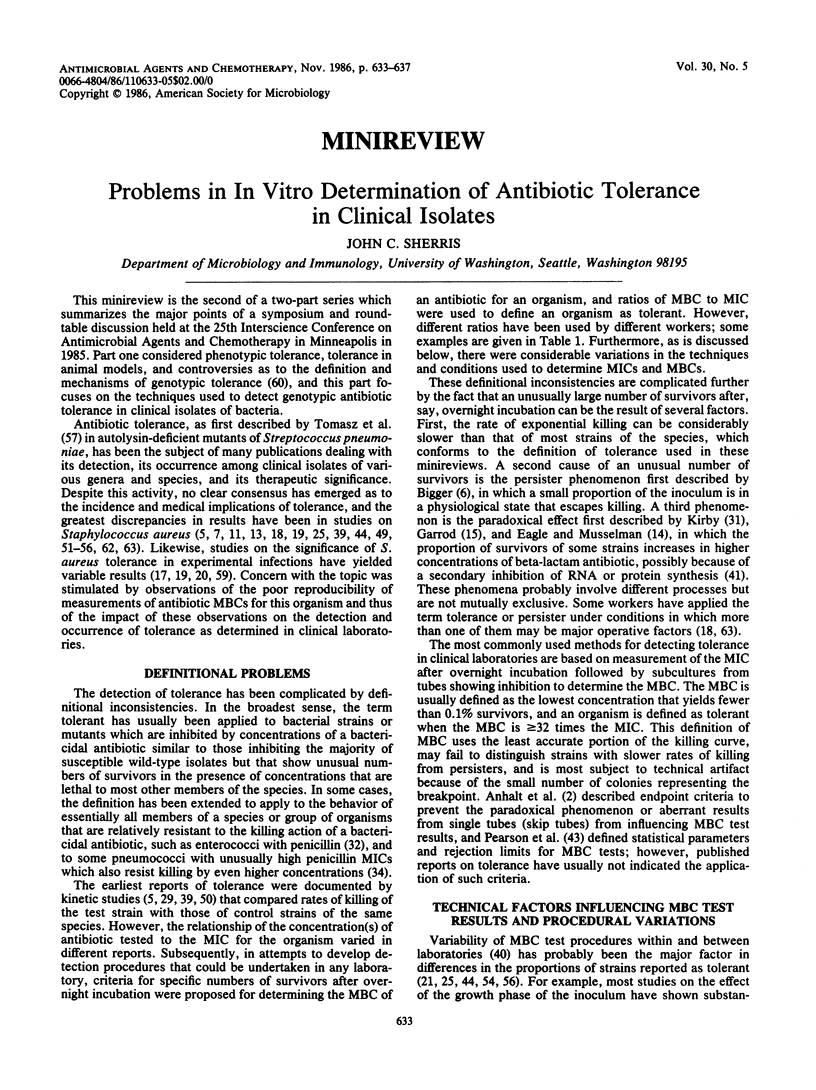
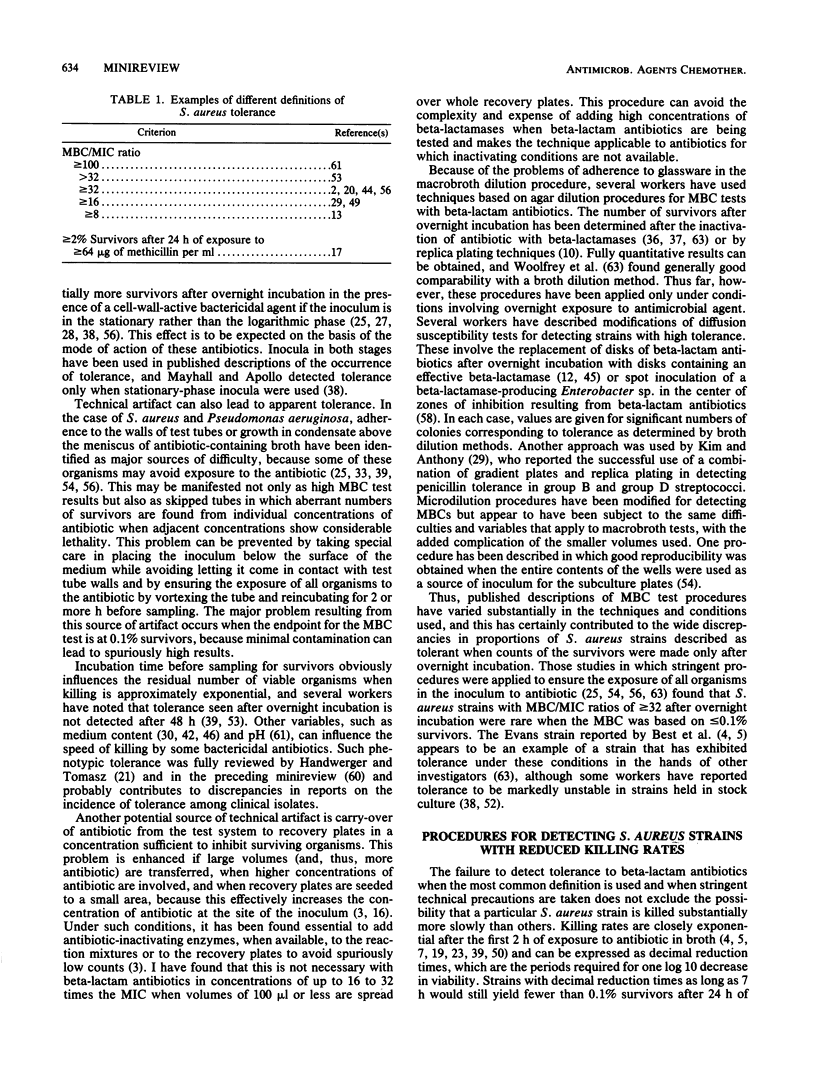
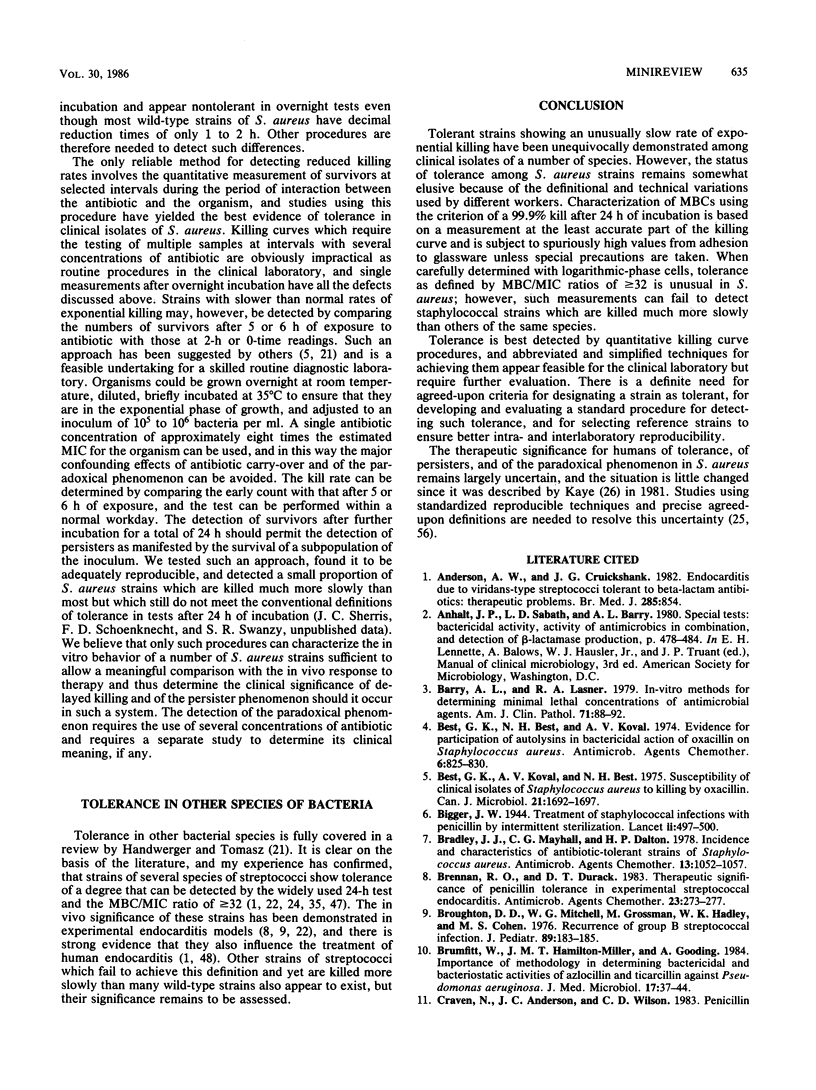
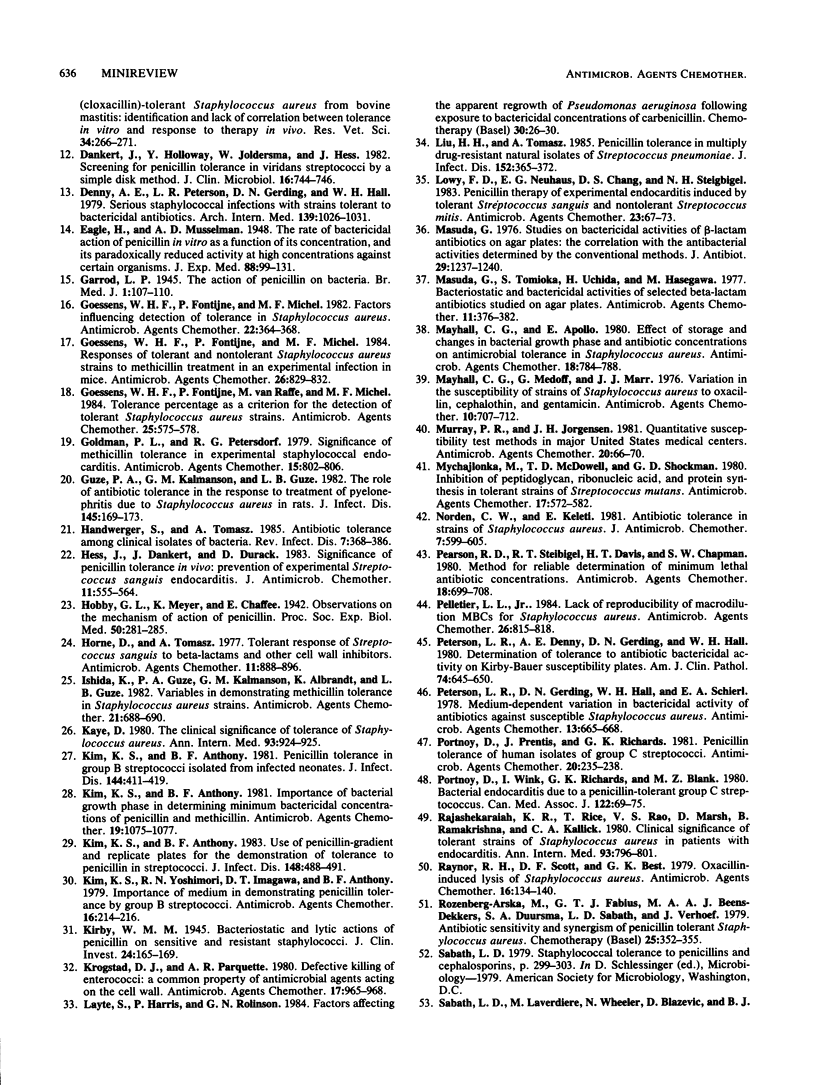
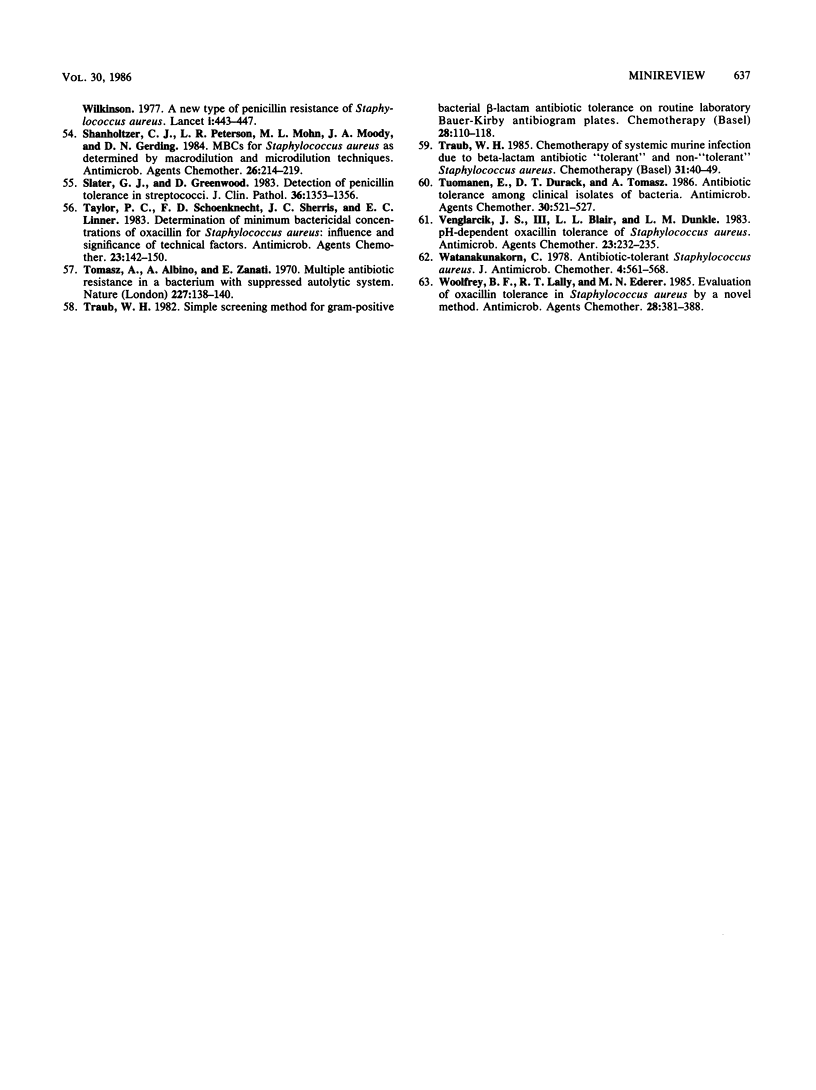
Selected References
These references are in PubMed. This may not be the complete list of references from this article.
- Anderson A. W., Cruickshank J. G. Endocarditis due to viridans-type streptococci tolerant to beta-lactam antibiotics: therapeutic problems. Br Med J (Clin Res Ed) 1982 Sep 25;285(6345):854–854. doi: 10.1136/bmj.285.6345.854. [DOI] [PMC free article] [PubMed] [Google Scholar]
- Barry A. L., Lasner R. A. In-vitro methods for determining minimal lethal concentrations of antimicrobial agents. Am J Clin Pathol. 1979 Jan;71(1):88–92. doi: 10.1093/ajcp/71.1.88. [DOI] [PubMed] [Google Scholar]
- Best G. K., Best N. H., Koval A. V. Evidence for participation of autolysins in bactericidal action of oxacillin on Staphylococcus aureus. Antimicrob Agents Chemother. 1974 Dec;6(6):825–830. doi: 10.1128/aac.6.6.825. [DOI] [PMC free article] [PubMed] [Google Scholar]
- Best G. K., Koval A. V., Best N. H. Susceptibility of clinical isolates of Staphylococcus aureus to killing by oxacillin. Can J Microbiol. 1975 Nov;21(11):1692–1697. doi: 10.1139/m75-248. [DOI] [PubMed] [Google Scholar]
- Bradely J. J., Mayhall C. G., Dalton H. P. Incidence and characteristics of antibiotic-tolerant strains of Staphylococcus aureus. Antimicrob Agents Chemother. 1978 Jun;13(6):1052–1057. doi: 10.1128/aac.13.6.1052. [DOI] [PMC free article] [PubMed] [Google Scholar]
- Brennan R. O., Durack D. T. Therapeutic significance of penicillin tolerance in experimental streptococcal endocarditis. Antimicrob Agents Chemother. 1983 Feb;23(2):273–277. doi: 10.1128/aac.23.2.273. [DOI] [PMC free article] [PubMed] [Google Scholar]
- Broughton D. D., Mitchell W. G., Grossman M., Hadley W. K., Cohen M. S. Recurrence of group B streptococcal infection. J Pediatr. 1976 Aug;89(2):182–185. doi: 10.1016/s0022-3476(76)80441-6. [DOI] [PubMed] [Google Scholar]
- Brumfitt W., Hamilton-Miller J. M., Gooding A. Importance of methodology in determining bactericidal and bacteriostatic activities of azlocillin and ticarcillin against Pseudomonas aeruginosa. J Med Microbiol. 1984 Feb;17(1):37–44. doi: 10.1099/00222615-17-1-37. [DOI] [PubMed] [Google Scholar]
- Dankert J., Holloway Y., Joldersma W., Hess J. Screening for penicillin tolerance in viridans streptococci by a simple disk method. J Clin Microbiol. 1982 Oct;16(4):744–746. doi: 10.1128/jcm.16.4.744-746.1982. [DOI] [PMC free article] [PubMed] [Google Scholar]
- Denny A. E., Peterson L. R., Gerding D. N., Hall W. H. Serious staphylococcal infections with strains tolerant to bactericidal antibiotics. Arch Intern Med. 1979 Sep;139(9):1026–1031. [PubMed] [Google Scholar]
- Garrod L. P. Action of Penicillin on Bacteria. Br Med J. 1945 Jan 27;1(4386):107–110. doi: 10.1136/bmj.1.4386.107. [DOI] [PMC free article] [PubMed] [Google Scholar]
- Goessens W. H., Fontijne P., Michel M. F. Factors influencing detection of tolerance in Staphylococcus aureus. Antimicrob Agents Chemother. 1982 Sep;22(3):364–368. doi: 10.1128/aac.22.3.364. [DOI] [PMC free article] [PubMed] [Google Scholar]
- Goessens W. H., Fontijne P., Michel M. F. Responses of tolerant and nontolerant Staphylococcus aureus strains to methicillin treatment in an experimental infection in mice. Antimicrob Agents Chemother. 1984 Dec;26(6):829–832. doi: 10.1128/aac.26.6.829. [DOI] [PMC free article] [PubMed] [Google Scholar]
- Goessens W. H., Fontijne P., van Raffe M., Michel M. F. Tolerance percentage as a criterion for the detection of tolerant Staphylococcus aureus strains. Antimicrob Agents Chemother. 1984 May;25(5):575–578. doi: 10.1128/aac.25.5.575. [DOI] [PMC free article] [PubMed] [Google Scholar]
- Goldman P. L., Petersdorf R. G. Significance of methicillin tolerance in experimental staphylococcal endocarditis. Antimicrob Agents Chemother. 1979 Jun;15(6):802–806. doi: 10.1128/aac.15.6.802. [DOI] [PMC free article] [PubMed] [Google Scholar]
- Guze P. A., Kalmanson G. M., Guze L. B. The role of antibiotic tolerance in the response to treatment of pyelonephritis due to Staphylococcus aureus in rats. J Infect Dis. 1982 Feb;145(2):169–173. doi: 10.1093/infdis/145.2.169. [DOI] [PubMed] [Google Scholar]
- Handwerger S., Tomasz A. Antibiotic tolerance among clinical isolates of bacteria. Rev Infect Dis. 1985 May-Jun;7(3):368–386. doi: 10.1093/clinids/7.3.368. [DOI] [PubMed] [Google Scholar]
- Hess J., Dankert J., Durack D. Significance of penicillin tolerance in vivo: prevention of experimental Streptococcus sanguis endocarditis. J Antimicrob Chemother. 1983 Jun;11(6):555–564. doi: 10.1093/jac/11.6.555. [DOI] [PubMed] [Google Scholar]
- Horne D., Tomasz A. Tolerant response of Streptococcus sanguis to beta-lactams and other cell wall inhibitors. Antimicrob Agents Chemother. 1977 May;11(5):888–896. doi: 10.1128/aac.11.5.888. [DOI] [PMC free article] [PubMed] [Google Scholar]
- Ishida K., Guze P. A., Kalmanson G. M., Albrandt K., Guze L. B. Variables in demonstrating methicillin tolerance in Staphylococcus aureus strains. Antimicrob Agents Chemother. 1982 Apr;21(4):688–690. doi: 10.1128/aac.21.4.688. [DOI] [PMC free article] [PubMed] [Google Scholar]
- Kaye D. The clinical significance of tolerance of Staphylococcus aureus. Ann Intern Med. 1980 Dec;93(6):924–926. doi: 10.7326/0003-4819-93-6-924. [DOI] [PubMed] [Google Scholar]
- Kim K. S., Anthony B. F. Importance of bacterial growth phase in determining minimal bactericidal concentrations of penicillin and methicillin. Antimicrob Agents Chemother. 1981 Jun;19(6):1075–1077. doi: 10.1128/aac.19.6.1075. [DOI] [PMC free article] [PubMed] [Google Scholar]
- Kim K. S., Anthony B. F. Penicillin tolerance in group B streptococci isolated from infected neonates. J Infect Dis. 1981 Nov;144(5):411–419. doi: 10.1093/infdis/144.5.411. [DOI] [PubMed] [Google Scholar]
- Kim K. S., Anthony B. F. Use of penicillin-gradient and replicate plates for the demonstration of tolerance to penicillin in streptococci. J Infect Dis. 1983 Sep;148(3):488–491. doi: 10.1093/infdis/148.3.488. [DOI] [PubMed] [Google Scholar]
- Kim K. S., Yoshimori R. N., Imagawa D. T., Anthony B. F. Importance of medium in demonstrating penicillin tolerance by group B streptococci. Antimicrob Agents Chemother. 1979 Aug;16(2):214–216. doi: 10.1128/aac.16.2.214. [DOI] [PMC free article] [PubMed] [Google Scholar]
- Kirby W. M. BACTERIOSTATIC AND LYTIC ACTIONS OF PENICILLIN ON SENSITIVE AND RESISTANT STAPHYLOCOCCI. J Clin Invest. 1945 Mar;24(2):165–169. doi: 10.1172/JCI101593. [DOI] [PMC free article] [PubMed] [Google Scholar]
- Krogstad D. J., Pargwette A. R. Defective killing of enterococci: a common property of antimicrobial agents acting on the cell wall. Antimicrob Agents Chemother. 1980 Jun;17(6):965–968. doi: 10.1128/aac.17.6.965. [DOI] [PMC free article] [PubMed] [Google Scholar]
- Layte S., Harris P., Rolinson G. N. Factors affecting the apparent regrowth of Pseudomonas aeruginosa following exposure to bactericidal concentrations of carbenicillin. Chemotherapy. 1984;30(1):26–30. doi: 10.1159/000238240. [DOI] [PubMed] [Google Scholar]
- Liu H. H., Tomasz A. Penicillin tolerance in multiply drug-resistant natural isolates of Streptococcus pneumoniae. J Infect Dis. 1985 Aug;152(2):365–372. doi: 10.1093/infdis/152.2.365. [DOI] [PubMed] [Google Scholar]
- Lowy F. D., Neuhaus E. G., Chang D. S., Steigbigel N. H. Penicillin therapy of experimental endocarditis induced by tolerant Streptococcus sanguis and nontolerant Streptococcus mitis. Antimicrob Agents Chemother. 1983 Jan;23(1):67–73. doi: 10.1128/aac.23.1.67. [DOI] [PMC free article] [PubMed] [Google Scholar]
- Masuda G. Studies on bactericidal activities of beta-lactam antibiotics on agar plates: the correlation with the antibacterial activities determined by the conventional methods. J Antibiot (Tokyo) 1976 Nov;29(11):1237–1240. doi: 10.7164/antibiotics.29.1237. [DOI] [PubMed] [Google Scholar]
- Masuda G., Tomioka S., Uchida H., Hasegawa M. Bacteriostatic and bactericidal activities of selected beta-lactam antibiotics studied on agar plates. Antimicrob Agents Chemother. 1977 Mar;11(3):376–382. doi: 10.1128/aac.11.3.376. [DOI] [PMC free article] [PubMed] [Google Scholar]
- Mayhall C. G., Apollo E. Effect of storage and changes in bacterial growth phase and antibiotic concentrations on antimicrobial tolerance in Staphylococcus aureus. Antimicrob Agents Chemother. 1980 Nov;18(5):784–788. doi: 10.1128/aac.18.5.784. [DOI] [PMC free article] [PubMed] [Google Scholar]
- Mayhall C. G., Medoff G., Marr J. J. Variation in the susceptibility of strains of Staphylococcus aureus to oxacillin, cephalothin, and gentamicin. Antimicrob Agents Chemother. 1976 Oct;10(4):707–712. doi: 10.1128/aac.10.4.707. [DOI] [PMC free article] [PubMed] [Google Scholar]
- Murray P. R., Jorgensen J. H. Quantitative susceptibility test methods in major United States medical centers. Antimicrob Agents Chemother. 1981 Jul;20(1):66–70. doi: 10.1128/aac.20.1.66. [DOI] [PMC free article] [PubMed] [Google Scholar]
- Mychajlonka M., McDowell T. D., Shockman G. D. Inhibition of peptidoglycan, ribonucleic acid, and protein synthesis in tolerant strains of Streptococcus mutans. Antimicrob Agents Chemother. 1980 Apr;17(4):572–582. doi: 10.1128/aac.17.4.572. [DOI] [PMC free article] [PubMed] [Google Scholar]
- Norden C. W., Keleti E. Antibiotic tolerance in strains of Staphylococcus aureus. J Antimicrob Chemother. 1981 Jun;7(6):599–605. doi: 10.1093/jac/7.6.599. [DOI] [PubMed] [Google Scholar]
- Pearson R. D., Steigbigel R. T., Davis H. T., Chapman S. W. Method of reliable determination of minimal lethal antibiotic concentrations. Antimicrob Agents Chemother. 1980 Nov;18(5):699–708. doi: 10.1128/aac.18.5.699. [DOI] [PMC free article] [PubMed] [Google Scholar]
- Pelletier L. L., Jr Lack of reproducibility of macrodilution MBCs for Staphylococcus aureus. Antimicrob Agents Chemother. 1984 Dec;26(6):815–818. doi: 10.1128/aac.26.6.815. [DOI] [PMC free article] [PubMed] [Google Scholar]
- Peterson L. R., Denny A. E., Gerding D. N., Hall W. H. Determination of tolerance to antibiotic bactericidal activity on Kirby-Bauer susceptibility plates. Am J Clin Pathol. 1980 Nov;74(5):645–650. doi: 10.1093/ajcp/74.5.645. [DOI] [PubMed] [Google Scholar]
- Peterson L. R., Gerding D. N., Hall W. H., Schierl E. A. Medium-dependent variation in bactericidal activity of antibiotics against susceptible Staphylococcus aureus. Antimicrob Agents Chemother. 1978 Apr;13(4):665–668. doi: 10.1128/aac.13.4.665. [DOI] [PMC free article] [PubMed] [Google Scholar]
- Portnoy D., Prentis J., Richards G. K. Penicillin tolerance of human isolates of group C streptococci. Antimicrob Agents Chemother. 1981 Aug;20(2):235–238. doi: 10.1128/aac.20.2.235. [DOI] [PMC free article] [PubMed] [Google Scholar]
- Portnoy D., Wink I., Richards G. K., Blanc M. Z. Bacterial endocarditis due to a penicillin-tolerant group C streptococcus. Can Med Assoc J. 1980 Jan 12;122(1):69-70, 75. [PMC free article] [PubMed] [Google Scholar]
- Rajashekaraiah K. R., Rice T., Rao V. S., Marsh D., Ramakrishna B., Kallick C. A. Clinical significance of tolerant strains of Staphylococcus aureus in patients with endocarditis. Ann Intern Med. 1980 Dec;93(6):796–801. doi: 10.7326/0003-4819-93-6-796. [DOI] [PubMed] [Google Scholar]
- Raynor R. H., Scott D. F., Best G. K. Oxacillin-induced lysis of Staphylococcus aureus. Antimicrob Agents Chemother. 1979 Aug;16(2):134–140. doi: 10.1128/aac.16.2.134. [DOI] [PMC free article] [PubMed] [Google Scholar]
- Rozenberg-Arska M., Fabius G. T., Beens-Dekkers M. A., Duursma S. A., Sabath L. D., Verhoef J. Antibiotic sensitivity and synergism of 'penicillin-tolerant' Staphylococcus aureus. Chemotherapy. 1979;25(6):352–355. doi: 10.1159/000237863. [DOI] [PubMed] [Google Scholar]
- Sabath L. D., Wheeler N., Laverdiere M., Blazevic D., Wilkinson B. J. A new type of penicillin resistance of Staphylococcus aureus. Lancet. 1977 Feb 26;1(8009):443–447. doi: 10.1016/s0140-6736(77)91941-9. [DOI] [PubMed] [Google Scholar]
- Shanholtzer C. J., Peterson L. R., Mohn M. L., Moody J. A., Gerding D. N. MBCs for Staphylococcus aureus as determined by macrodilution and microdilution techniques. Antimicrob Agents Chemother. 1984 Aug;26(2):214–219. doi: 10.1128/aac.26.2.214. [DOI] [PMC free article] [PubMed] [Google Scholar]
- Slater G. J., Greenwood D. Detection of penicillin tolerance in streptococci. J Clin Pathol. 1983 Dec;36(12):1353–1356. doi: 10.1136/jcp.36.12.1353. [DOI] [PMC free article] [PubMed] [Google Scholar]
- Taylor P. C., Schoenknecht F. D., Sherris J. C., Linner E. C. Determination of minimum bactericidal concentrations of oxacillin for Staphylococcus aureus: influence and significance of technical factors. Antimicrob Agents Chemother. 1983 Jan;23(1):142–150. doi: 10.1128/aac.23.1.142. [DOI] [PMC free article] [PubMed] [Google Scholar]
- Tomasz A., Albino A., Zanati E. Multiple antibiotic resistance in a bacterium with suppressed autolytic system. Nature. 1970 Jul 11;227(5254):138–140. doi: 10.1038/227138a0. [DOI] [PubMed] [Google Scholar]
- Traub W. H. Chemotherapy of systemic murine infection due to beta-lactam antibiotic 'tolerant' and non-'tolerant' Staphylococcus aureus. Chemotherapy. 1985;31(1):40–49. doi: 10.1159/000238312. [DOI] [PubMed] [Google Scholar]
- Traub W. H. Simple screening method for gram-positive bacterial beta-lactam antibiotic tolerance on routine laboratory Bauer-Kirby antibiogram plates. Chemotherapy. 1982;28(2):110–118. doi: 10.1159/000238065. [DOI] [PubMed] [Google Scholar]
- Tuomanen E., Durack D. T., Tomasz A. Antibiotic tolerance among clinical isolates of bacteria. Antimicrob Agents Chemother. 1986 Oct;30(4):521–527. doi: 10.1128/aac.30.4.521. [DOI] [PMC free article] [PubMed] [Google Scholar]
- Venglarcik J. S., 3rd, Blair L. L., Dunkle L. M. pH-dependent oxacillin tolerance of Staphylococcus aureus. Antimicrob Agents Chemother. 1983 Feb;23(2):232–235. doi: 10.1128/aac.23.2.232. [DOI] [PMC free article] [PubMed] [Google Scholar]
- Watanakunakorn C. Antibiotic-tolerant Staphylococcus aureus. J Antimicrob Chemother. 1978 Nov;4(6):561–568. doi: 10.1093/jac/4.6.561. [DOI] [PubMed] [Google Scholar]
- Woolfrey B. F., Lally R. T., Ederer M. N. Evaluation of oxacillin tolerance in Staphylococcus aureus by a novel method. Antimicrob Agents Chemother. 1985 Sep;28(3):381–388. doi: 10.1128/aac.28.3.381. [DOI] [PMC free article] [PubMed] [Google Scholar]



